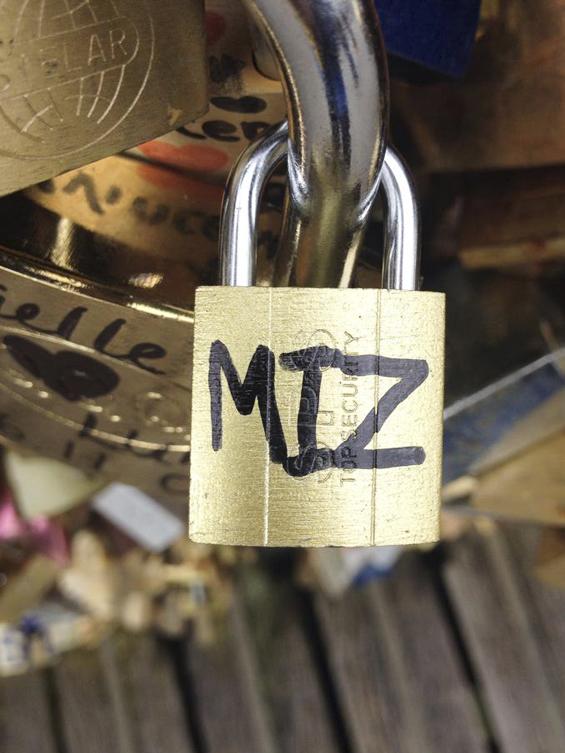
After the protests on campus this semester, French exchange student Mathilde Saint-Genis decided to relax at the pool in the Student Recreation Complex on Friday, Nov. 13. She believed the rough week was over. Then someone told her about the terror attacks in Paris.
Paris experienced [six terror attacks](http://www.nbcnews.com/storyline/paris-terror-attacks) that nightat the hands of ISIS, which resulted in over 130 deaths and more than 350 wounded.
“I just thought, ‘not again,’ because of the attacks on Charlie Hebdo in January, but I felt that (this situation) was much bigger than what happened in January,” Saint-Genis said.
The November attacks occurred only ten months after the satirical magazine [Charlie Hebdo was attacked](http://www.bbc.com/news/world-europe-30708237) in Paris on Jan. 7, 2015, resulting in the deaths of 12 people.
Senior Tifani Akobe was in Colorado on a trip when her friend woke her up and asked if she knew about the attacks. When she realized her friend was not referring to Charlie Hebdo, Akobe jumped out of bed and immediately checked Facebook.
Originally from French Guinea, Akobe moved to Paris to attend college. After two years in France, she knows many people who live there and still maintains connections with people from home. She is currently an exchange student at MU.
“I am lucky to not be in Paris because my parents would be freaking out for several hours,” Akobe said.
Alexandre Boyer is originally from Aurillac, France, and is studying at MU for a semester while obtaining his master’s degree from the Purpan Engineering School. His brother is currently studying in Paris but was not harmed during the attacks. However, some of his brother’s friends were at restaurants very close to where some of the attacks occurred.
“I feel pretty shocked about it,” Boyer said. “When I heard about it, I was on the phone with my mom, and she told me that there were shootings and two or three dead people, so it was just the beginning.”
Like Akobe, Saint-Genis and Boyer continually checked Facebook for updates on the situation.
“I wanted to know where it happened,” Saint-Genis said. “I just wanted to have all the information possible.”
Saint-Genis said she finds it difficult to move on when stories of new leads and arrests keep arising.
“I feel like (the French) are trying to move on, but I’m a bit afraid that it’s going to happen again because it was so big, and ISIS said it wouldn’t be the last attack,” Saint-Genis said. “I’m scared because I don’t know if there will be another attack next week or in two months or anything.”
Akobe recognized that countries all over the world, including some American politicians, are considering more restrictive refugee policies because of the revelation that one of the terrorists in the attacks entered the European Union as a refugee. She encouraged people to not let this hurt the opportunity to provide a safe haven for those escaping war in the Middle East.
Akobe outlined a situation that she says would be the same if nations did not grant asylum.
“I’m thinking about it like this: I saw the video of people running out of the place where there was a concert,” Akobe said. “They were screaming. Can you imagine that there is someone outside, closing the door, saying ‘No, don’t come outside, you will bring the killer with you’? If we close the door for the refugees, we’ll be the same thing. We don’t need to stop welcoming refugees, because they need help.”
Akobe was in Paris during the attack on Charlie Hebdo.
She was in an underground mall when her sister sent her panicked text messages asking her whereabouts. Soon after, the world stood in solidarity against the acts in a movement called “Je suis Charlie,” or “I am Charlie.” Akobe did not take part.
“People are dying for nothing, but I don’t think that I should take a preference for Paris and say, ‘Oh, it’s more sad than for the other ones,’” Akobe said.
Similarly, Akobe said that people around the world are continuing to focus on Paris and do not seem to care about the double suicide attack that happened in Beirut during the same week. When she goes onto her Facebook page or listens to the news, Akobe said she only hears news of the France attack.
In light of increased threats, Boyer believes France needs to maintain its reputation and to not use the terror attacks as a reason to ostracize Muslims.
“We need to increase the safety in (France),” Boyer said. “We have to stay a good nation and not separate Muslims and Christians.”
Akobe said that Islamophobia has increased since the Charlie Hebdo attacks, but people need to realize that Muslims are not the problem.
“I’ve read some fragment of the Quran,” Akobe said. “In there it says something like ‘Don’t kill people.’ It is something that their god does not want. People think that terrorists are Muslims. They are not. Don’t be afraid of Muslim people.”